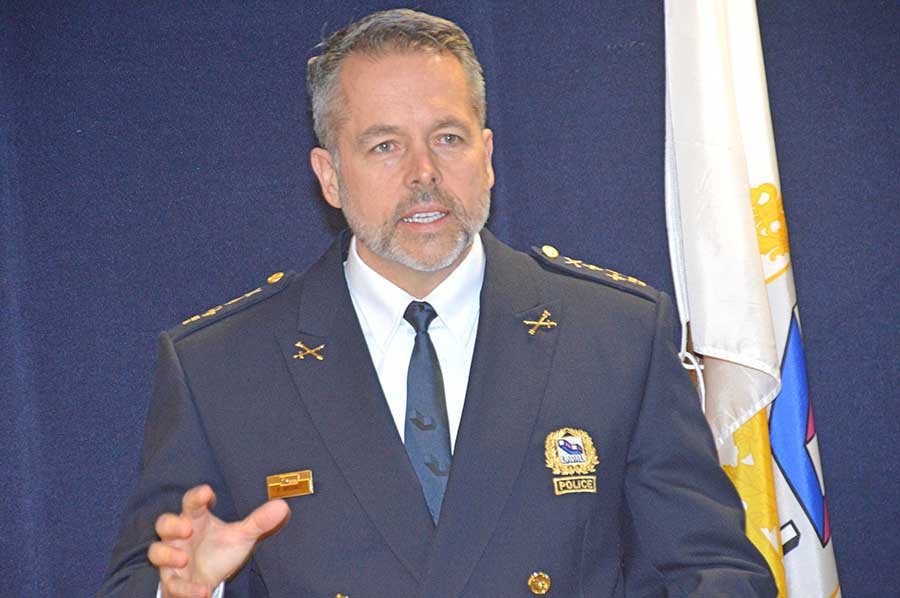
Martin C. Barry
For the fifth year since the Laval Ethics and Integrity Bureau (BIEL) first started, Laval Police chief Pierre Brochet has tabled his latest report on continuing efforts to track and prevent acts of corruption within the City of Laval’s administration.
The BIEL was created shortly after Brochet was hired, in the aftermath of the highly-publicized corruption and municipal contracts kickback scandal involving disgraced former mayor Gilles Vaillancourt.
Arm’s length from city
The office, which operates at arm’s length from the city administration, was given a mandate to oversee internal investigations, while working in conjunction with the Laval Police Department.
“I am truly proud of the results and accomplishments of the BIEL, and all the more so when we know that several municipalities are expressing a wish to create their own integrity bureaus,” Brochet said during a press conference held at Laval Police headquarters on Chomedey Blvd. on April 4 to release the results.
Leading the way
“It is an honour for us to have developed the expertise for a team responsible for investigations of this type,” he added. “Mostly a team that has had to be ahead of things by developing responses, as well as codes of conduct adapted to the reality of the employees and elected officials of Laval.”
According to a summary of the report, just three cases out of a total of 86 potential administrative wrongdoings ended up being reported for in-depth investigation to the Unité permanente anticorruption (UPAC), the Quebec government’s specialized agency that fights corruption, collusion and other economic crimes involving provincial government procurement.

Fewer cases went to UPAC
In comparison, four cases went to UPAC in 2017, eight in 2016, 10 in 2015 and 11 in 2014. Out of the 86 potential administrative wrongdoing cases in 2018, 10 cases were deemed serious enough to merit being investigated by the local police, while 73 others were judged to be administrative problems that could be resolved internally.
The statistics from last year for the 73 administrative cases show that conflict of interest ranked high among commonly reported problems, while breaching confidentiality was also on the radar. The most serious cases in 2018 involved allegations of fraud and theft. However, only one case led to criminal charges. According to last year’s BIEL report, a supervisor was arrested after being seen while in the act of stealing equipment that was the property of the city. He was subsequently fired.
Drivers ‘under the influence’
The report says the BIEL also became involved last year when it was discovered that drivers for some sub-contractors working for the city were operating while under the influence of alcohol or drugs. Measures were taken by the BIEL as well as by the Laval Police to warn the sub-contractors about their responsibilities.
The BIEL oversaw workshops where up to 2,000 employees received instruction in the ethical standards they are expected to live up to. As well, the BIEL received requests from employees seeking orientation for specific situations involving ethical decision-making.
Six years since crackdown
This most recent report contrasts sharply with the situation in May six years ago, when 37 people – including engineers, contractors and managers – were arrested in the massive police sweep that preceded the City of Laval’s being placed in trusteeship after the departure of ex-mayor Vaillancourt.
Among the compromising situations faced by city employees every year are conflicts of interest. The City of Laval’s code of ethics now clearly spells out the potential for ethical conflicts when employees are holding down a second job somewhere else, or are related to individuals with vested interests.

BIEL seems to be paying off
Some cases can also involve unauthorized use of municipal resources or access to confidential or privileged information. BIEL statistics compiled over the past five years show the City of Laval’s employees have been increasingly consulting the BIEL for guidance when they face uncertain situations ethically.
After releasing the report, Brochet announced that the Laval Police will continue an agreement with the City of Terrebonne on the North Shore which will see them working cooperatively to counter corruption and collusion on their respective territories. Terrebonne is basing an investigative unit of its own on Laval’s BIEL.
Partnership with Terrebonne
“The implementation of this partnership sends a message to all those involved working in the municipal domain in our region,” Brochet said. “Collusion and corruption are not acceptable or tolerated and we are making all the efforts necessary to prevent and control together this sort of crime.”
Service de Police de Terrebonne Marc Brisson said: “The decision to enter into a partnership with the BIEL through the opening of an integrity office by the City of Terrebonne makes sense economically and strategically at the same time. Economically, since it allows for the sharing of a large number of resources, such as offices and personnel. Strategically, since it allows us to share expertise, exchange contractual information and coordinate investigation files more efficiently.”



